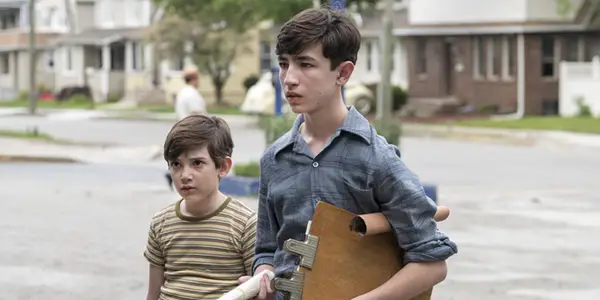THE PLOT AGAINST AMERICA “Part 1”: A Familiar Beginning

Digital Media Program Coordinator and Professor at Southern Utah University…
David Simon and Ed Burns, the brilliant creative duo responsible for arguably the greatest television show of all time, return to HBO with The Plot Against America, based on the novel of the same name by Philip Roth. The story imagines an alternate history in which isolationist and Nazi-sympathizer Charles Lindbergh defeats Franklin D. Roosevelt in the 1940 presidential election.
Disclaimer: I’ve read differing opinions on whether a term like “anti-Semitism” should be used interchangeably with a term like “racism.” Opinions vary, particularly in regard to the interests of Israel as a country vs. the worldwide Jewish community at large. I am not Jewish and have therefore tried to do my research concerning the appropriate use of language for these reviews. A standard that makes sense to me was set by the Anne Frank House:
“Jews are not a race, and categorising people according to race is wrong and dangerous. Even so, some people still believe in the concept. If it is the basis for their hatred of Jews, it is undoubtedly racist.” (emphasis added)
As The Plot Against America deals specifically with this exact type of hatred toward the Jewish community, I will, therefore, be using the term “racism” frequently throughout these reviews when referring to that hatred. My intent in doing so is for ease of communication, and I truly hope I do not cause offense in so doing.
Episode Summary
In Part 1 of The Plot Against America, we follow a small Jewish family, based closely on Roth’s real-life family at the time, living in New Jersey in June of 1940. Living in a tight-knit Jewish community, Philip himself (Azhy Robertson) is mostly isolated from the rhetoric outside, unable to understand what his father means by the phrase “fascist bastards.” The patriarch of the family, Herman (Morgan Spector), is a loving husband and father who is increasingly concerned with the potential danger to his family. By the end of the episode, Charles Lindbergh has been announced as the Republican Nominee for the Presidency.

The various family members contend with the increasing bigotry in their own ways. Bess (Zoe Kazan), a devoted mother, acts as a quiet but powerful anchor, a strong juxtaposition to Herman’s anger at the rapidly devolving political situation. Her older sister, Evelyn (Winona Ryder), desperately seeks companionship. Herman’s nephew, Alvin (Anthony Boyle), responds to violence with violence in order to avenge a racially motivated attack on his friend. Philip’s older brother Sandy (Caleb Malis) retreats into his drawings, many of which depict Lindbergh himself, whom he idolizes. Philip, struggling with puberty, tries to find his place among various contending mentors.
Mastery in Craft
The opening scene depicts a school-age boy using chalk to draw a line on the road. At first, we’re too close to see the overall picture, but eventually, we pull back to see other boys, all of them standing on a circular chart divided into slices, each slice labeled with the name of a different country. We realize that the boys are playing a childhood game, familiar in almost every way to each of us, but with a critical difference: the “characters” in this game are not superheroes, or protagonists dueling antagonists in recreations of popular radio programs, but rather, warring countries. The scene offers a stark contrast to the differences between this time and our own. From the opening shot, in signature David Simon style, the thematic core of the show is clear.
A touching moment between father and son occurs early in the episode, wherein Herman’s donation to a man going door-to-door collecting money for Jews “who are running from Hitler” and need “another homeland” prompts young Philip to ask an earnest question: “We don’t need another homeland, right?” His father looks at him sincerely, and reassuringly replies with a simple “No.” The moment is a powerful one, simultaneously exhibiting the character dynamics amongst the family, while also helping to establish Herman’s earnest sense of morality, all while providing terrifying foreshadowing for what is to come. These are just two of many examples throughout Part 1 in which absolute mastery of film narrative is fully on display.
Throughout the episode, we’re swiftly guided from scene to scene, each of which offers a clear picture, a candid slice of life for each generation, from school age to seniorhood. Various devices are employed, to masterful effect, to give the viewer a sense of understanding and empathy for each. For example, Philip’s struggles with puberty are strongly apparent as he simultaneously tries to reconcile the clashes between his father’s animosity toward Lindbergh, and his brother’s idolization of the same.

“Part 1” is a textbook example of perfection in building a narrative foundation. The divisions between groups and individuals are perfectly established. Hostility is implied, rather than superfluously explained, and yet so perfectly present that it seems to be familiar. Each character’s motivations are clearly defined by action and inference. Simon and Burns do it right: they expect their audience to be smart, and weave exposition in such a seamless way that it’s practically invisible.
A Stern Warning
Philip Roth chose 1940’s America as the setting for his story for a simple reason: history repeats itself, and we’ve reached the same point on a wave of trends that look very similar to those experienced at that time. The novel itself was published way back in 2004, proving Roth’s talent for foresight. This book and series, as well as the larger meaning of each, cannot be dismissed simply as “fiction.” It speaks to a very real danger that could be happening, right now. As Meilan Solly of Smithsonian Magazine writes: “Roth’s account of a celebrity-turned-politician winning the presidency on a platform of fearmongering and ‘othering’ proved more prophetic than he could have predicted.”

While patriotism of various forms is to be commended, any idea that promotes patriotism (or nationalism) above globalism (or the interests of humanity as a whole) is, at its core, wrong. This is the central idea explored in The Plot Against America. Lindbergh was an isolationist: his primary goal is to keep America out of the war raging in Europe and Asia. Roosevelt was like many others of Wilsonian persuasion who, after all other conceivable ideas to the contrary had been exhausted, were eventually interventionist: supportive of American involvement in the war. Put simply, while war itself is very rarely commendable, allowing citizens of other nations to march to their deaths while claiming exception exclusively for one’s own country is arguably just as morally reprehensible.
Today, we have a President who in many ways is just as much the isolationist Lindbergh was, even going so far as to use much of the same rhetoric, such as “America First” and language very much in line with an “us vs. them” mentality. As Forbes’ John Brinkley writes:
“Withdrawing from the TPP, threatening a trade war with China, demanding a renegotiation of the Korea-US Free Trade Agreement, – these actions go beyond Trump’s “America First” ideology. They go beyond unilateralism. Combined with the forced renegotiation of NAFTA, the abandonment of Trans-Atlantic Trade and Investment Partnership with the European Union, trying to eviscerate the WTO, and Trump’s disdain for multilateral trade agreements, they approach the kind of isolationism unseen seen since the Great Depression.”
Some reviewers have said The Plot Against America makes too much of a commentary on modern topics, and that doing so damages its credibility. These reviews are shortsighted. Philip Roth himself said of writing the book: “Whenever I got stuck, which was frequently, I would say to myself: ‘Don’t invent. Just remember.'”
How does one “remember” something that never happened? Simple. It is happening. It has started to happen. It’s happened before and it will again. All of us can remember dark periods in our history, when racism and bigotry were far too prevalent. If we are to rise above nationalism in favor of globalism, we must work toward change now, and paying attention to the warnings of great storytellers like Philip Roth, David Simon, and Ed Burns, would be a very good place to start.
The Plot Against America: Part 1 aired on March 16th, 2020, on HBO.
Does content like this matter to you?
Become a Member and support film journalism. Unlock access to all of Film Inquiry`s great articles. Join a community of like-minded readers who are passionate about cinema - get access to our private members Network, give back to independent filmmakers, and more.
Digital Media Program Coordinator and Professor at Southern Utah University and Southwest Technical College; M.Ed.; Author at Labyrinth Learning and Film Inquiry. Passionate educator of film theory and history. World-class nerd with a wide array of interests and a deep love for many different fandoms.













